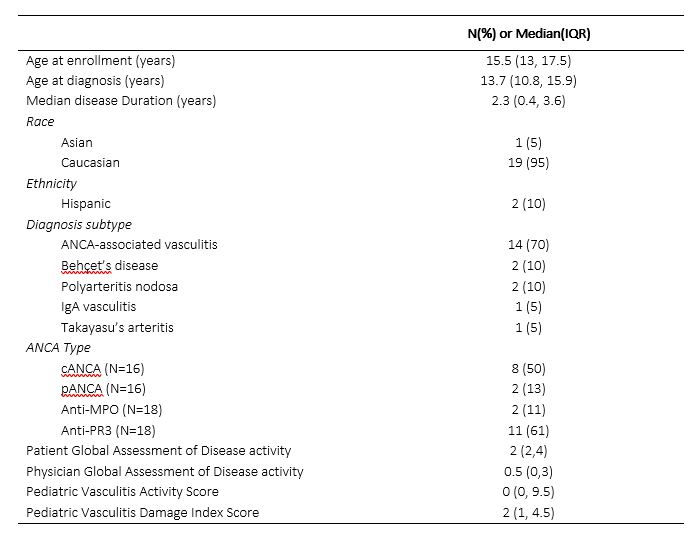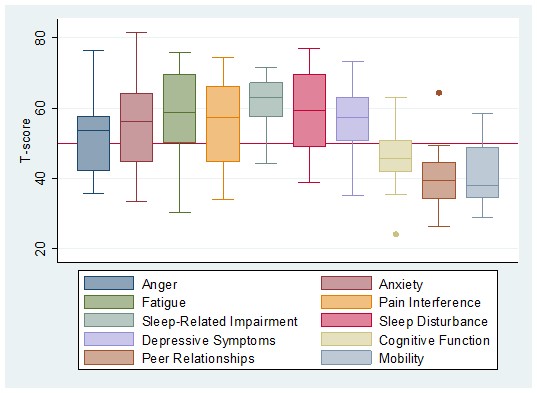Session Information
Session Type: Poster Session A
Session Time: 6:00PM-7:00PM
Background/Purpose: Vasculitis is a group of multisystem, often relapsing diseases that can affect patients through disease activity, damage, and treatment toxicity. Vasculitis in adults often has significant effects on health-related quality of life (HRQoL). Vasculitis in children occurs during critical times in psychosocial and physical development yet little is known on how these diseases and treatments affect HRQoL in children. This study aimed to evaluate HRQoL in patients with pediatric-onset vasculitis.
Methods: This was a prospective study of patients with vasculitis seen by pediatric rheumatology and/or pediatric nephrology at a single center tertiary care facility. Enrolled patients were those diagnosed with a chronic type of vasculitis before their 18th birthday who agreed to participate. Subjects were given a series of patient-reported outcome (PRO) measures during clinic visits, including several pediatric Patient-Reported Outcome Measures Information Systems (PROMIS) short forms. The treating provider concurrently filled out disease activity and damage measures (Pediatric Vasculitis Activity Score (PVAS) and Pediatric Vasculitis Damage Index (PVDI). Patients were enrolled at any time point in their disease course. Descriptive statistics and Spearmans Rank correlation were used.
Results: 20 patients participated, the majority of whom had ANCA-associated vasculitis. Median age at enrollment and age at diagnosis were 15.5 and 13.7 years, respectively (Table 1). Median disease duration was 2.3 years. 7/20 patients had active disease, defined as a PVAS 0 (median12, IQR 7.2 among active patients). 19/20 had at least one damage item scored on the PVDI, median 2, IQR 1, 4.5, range 0-18. Physician and patient global assessments of disease activity correlated (spearmans rho=0.65, p=0.005). PROMIS scores are displayed in Figure 1. The median score in all 10 domains queried was worse than the reference population, most notably in sleep-related impairment, depressive symptoms, cognitive function, peer relationships, and mobility.
Conclusion: Patients with pediatric-onset vasculitis have substantially worse scores than reference populations in multiple domains of HRQoL, including physical and psychosocial domains, demonstrating the negative life-altering effect of pediatric-onset vasculitis on HRQoL. Patient and physician global assessments did not correlate, highlighting the need to capture patients perspectives when studying these diseases. Further work is needed to evaluate HRQoL in pediatric patients with vasculitis so that treatments can be targeted to both control active disease and improve HRQoL.
 Table 1. Presenting characteristics of patients
Table 1. Presenting characteristics of patients
 Figure 1. Boxplots of T scores from short forms of the *Patient Reported Outcome Measures Information System (PROMIS). T-scores for study subjects in each domain represents differences relative to the general population mean score that is set at a T score of 50. A higher T score represents more ore of the domain being measured, a lower T score represents less of the domain being measured.
Figure 1. Boxplots of T scores from short forms of the *Patient Reported Outcome Measures Information System (PROMIS). T-scores for study subjects in each domain represents differences relative to the general population mean score that is set at a T score of 50. A higher T score represents more ore of the domain being measured, a lower T score represents less of the domain being measured.
To cite this abstract in AMA style:
Peckenpaugh C, Hersh A, Inman C, Stern S, Treemarcki E, Merkel P, James K. Patient Reported Outcomes in Pediatric Vasculitis [abstract]. Arthritis Rheumatol. 2023; 75 (suppl 4). https://acrabstracts.org/abstract/patient-reported-outcomes-in-pediatric-vasculitis/. Accessed .« Back to 2023 Pediatric Rheumatology Symposium
ACR Meeting Abstracts - https://acrabstracts.org/abstract/patient-reported-outcomes-in-pediatric-vasculitis/
